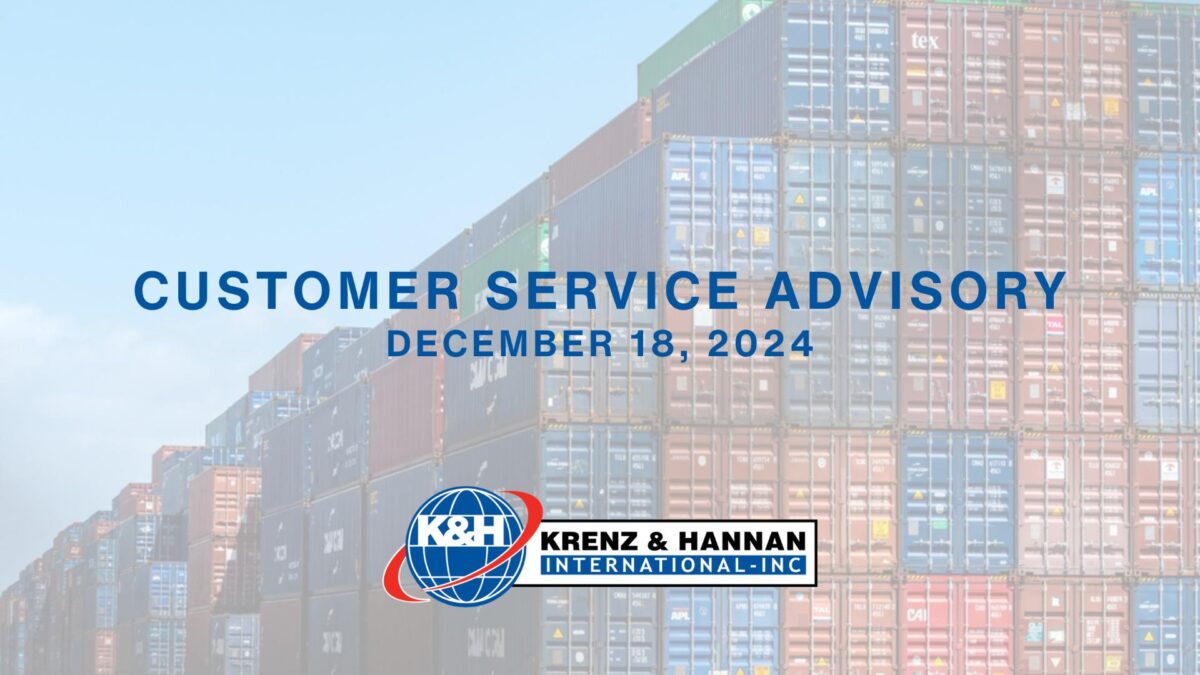
Hello Customers, Colleagues, and Friends…
We are writing to inform you of the current status of the ILA-USMX Contract Negotiations, Lacey Act Phase 7 implementation, and the potentially changing import tariff landscape.
To start, we would like to thank all of our Customers, Colleagues and Friends for your partnership and support in 2024. We wish you all a Merry Christmas and good health & prosperity in 2025. Please continue to keep Krenz and Hannan in mind for all of your International and Domestic Transportation needs. We remain at your service!
The ILA-USMX contract negotiations remain unresolved after the previous agreement expired on September 30, 2024. Although a temporary extension to January 15, 2025, was secured following a Biden administration intervention, disputes over automation have stalled progress. President-elect Trump’s recent support for the ILA has intensified tensions, with the USMX advocating for automation to enhance safety and efficiency. A significant work stoppage is expected on January 16, 2025, potentially leading to prolonged strikes. Businesses should prepare for disruptions by exploring alternative shipping strategies and consulting with logistics partners to mitigate impacts on supply chains although due to the scope of this potential disruption, alternate routings may not be an option.
As many of you know, the incoming Trump administration has been outspoken on adding tarriffs and changing the landscape of import duties. The prospect of these changes is creating divisions among U.S. businesses. While some domestic manufacturers support tariffs as a way to protect against foreign competition, others fear the resulting higher costs for materials and goods will harm their operations. Importers and retailers are particularly concerned about price increases, supply chain disruptions, and the potential strain on cost-sensitive consumers. Importers across industries are preparing for a range of challenges, from stockpiling goods to adjusting pricing strategies, as they navigate the uncertainty of proposed trade policies. There remains a significant amount of uncertainty as to what changes will take place and how soon they can be implemented.
As of December 1, 2024, the USDA’s APHIS will implement Phase VII of the Lacey Act provisions, requiring importers to file declarations for a wide range of plant-based products, such as handbags, plywood, bamboo goods, tools, and footwear, unless they are entirely composite materials. Importers must ensure their products comply with foreign and domestic laws, as the Lacey Act prohibits the trade of illegally harvested plants. This phase broadens the scope of affected products, increasing the responsibility on businesses to conduct due diligence, reduce demand for illegal logging, and align with sustainable practices to avoid penalties and disruptions. Please see below links for FAQs to determine if any of your intended imports may be affected by the change in regulation. Also, see attached PPQ 505 form for declarations. In the event of necessary declaration, please work with your suppliers to complete the PPQ 505 form and send to your trusted customs broker, Krenz and Hannan, to file upon importation.
WHAT THIS MEANS FOR YOU
- Potential severe disruption to the US supply chain
- Prolonged Delays: Even a short strike could take days to resolve, while a longer disruption could paralyze ports into 2025, leading to backlogs and delays that ripple through supply chains.
- Potential changes to duty rates on imported goods
- Possibility of necessary Lacey Act filings on previsouly un-regulated goods
Please continue to plan accordingly for your import, export, and domestic transportation needs.
Sincerely, Your friends at Krenz and Hannan International
SOURCES
https://www.freightwaves.com/news/trump-again-backs-longshore-union-as-possible-port-strike-nears
https://www.npr.org/2024/12/14/nx-s1-5226782/trump-tariffs-business-economy
https://www.aphis.usda.gov/plant-imports/file-lacey-act-declaration/frequently-asked-questions
